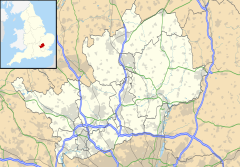Much Hadham
| Much Hadham | |
|---|---|
| Much Hadham shown within Hertfordshire | |
| Population | 2,862 (2011 census) |
| OS grid reference | TL426208 |
| Civil parish |
|
| District | |
| Shire county | |
| Region | |
| Country | England |
| Sovereign state | United Kingdom |
| Post town | Much Hadham |
| Postcode district | SG10 |
| Dialling code | 01279 |
| Police | Hertfordshire |
| Fire | Hertfordshire |
| Ambulance | East of England |
| EU Parliament | East of England |
| UK Parliament | |
Much Hadham, formerly known as Great Hadham, is a village and civil parish in the district of East Hertfordshire, Hertfordshire, England. The parish of Much Hadham contains the hamlets of Perry Green and Green Tye, as well as the village of Much Hadham itself. It covers 4,490 acres (1,820 ha). The village of Much Hadham is situated midway between Ware and Bishop's Stortford. The population of the parish was recorded as 2,862 in the 2011 census, an increase from 1,994 in 2001.
The name "Hadham" probably derives from Old English words meaning "Heath homestead". The affix "Much" comes from the Old English "mycel", meaning "great". The name changed around the time of the Civil War.
The parish has been occupied since the Roman period. There were pottery kilns in the parish in the Roman period, and a Roman coin hoard has been found nearby.
Written records of Much Hadham go back to the time of King Edgar. The village was a possession of the Bishops of London before the Norman Conquest, and it appears in the Domesday Book as "Hadham". The parish church was built from 1225–1450. The village was a staging point on the road from London to Cambridge and Newmarket, and the Olde Red Lion Inn, built in 15th century to serve this traffic, still survives in the village.
The Bishop's Palace was used as an asylum from 1817–1863.
During the First World War, there was a British Red Cross/Order of St. John auxiliary hospital in Much Hadham. Today, a plaque on the front of Woodham House commemorates this.
During the second world war, Much Hadham was the site of Prisoner of War camp 69. The camp was opened in 1939, housing Italian prisoners of war, and later German prisoners, as well as housing American and Gurkha soldiers as they prepared for the D-Day landings. The camp closed around 1950.
The village is linear stretched along its mile and a half long high street (High Street, Tower Hill and Widford Road) which runs along the river Ash. It is situated between Bishop's Stortford and Ware, about 12 kilometres (7.5 mi) from Hertford and about 40 kilometres (25 mi) north of London. The village had a railway station on the Buntingford single track branch line, which closed in 1965 under the Beeching Axe.
...
Wikipedia

